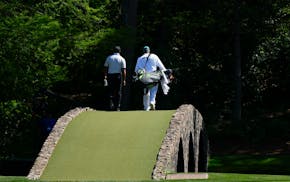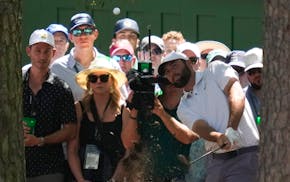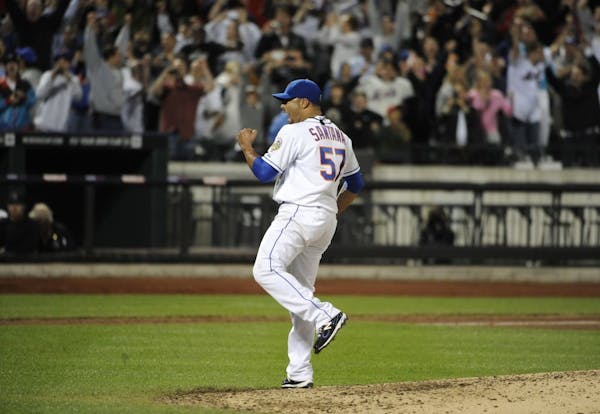The Rochester Red Wings' Friday night game had been rained out, so Bobby Cuellar, the team's pitching coach, was watching the Twins and Indians on TV.
"Suddenly, oompah, there's another game to watch," Cuellar said. "I got to watch the last three outs of Johan's game. I'm very happy for the young man. I mean, the man."
Johan Santana was a young man when Cuellar first met him. Friday night, Santana used the pitch Cuellar taught him a decade ago to pitch the first no-hitter in New York Mets history, finishing the game with a changeup that dived under the bat of Cardinals slugger David Freese.
Cuellar sounded embarrassed to be credited with helping Santana, but the Twins have always praised his work in helping Santana become one of the best pitchers in the game.
"Absolutely," said Twins assistant GM Rob Antony. "That's what everybody in the organization talked about, and that's what Johan talked about."
History doesn't leave Cuellar much room for humility.
Santana played mostly center field as a kid in Tovar, Merida, Venezuela. The Astros signed him in 1995.
In three seasons in the lower reaches of Houston's farm system, Santana posted ERAs of 7.36, 4.72 and 4.66. The Astros left Santana unprotected in the Rule 5 draft. The Marlins chose him, and the Twins traded a pitcher named Jared Camp for him.
Santana posted an ERA of 6.49 in 2000 and 4.74 in 2001. The Twins sent him to Class AAA Edmonton. Cuellar helped him develop a changeup. Santana struck out 13.9 batters per nine innings. His ERA dropped to 3.14 and he returned to the big leagues.
Before Santana worked with Cuellar, his lowest ERA in a full season of professional baseball had been 4.66 in Class A for the Astros in 1999. Since meeting Cuellar, Santana has not posted a big-league ERA higher than 3.33.
"I came to this organization in 2002, and that's the year they sent Johan down," Cuellar said Saturday from Rochester, N.Y., the home of the Twins' top minor league affiliate since 2003. "What I was told, and what we did, was just let him pitch. There were a lot of conversations, a lot of discussions. You had a lot to work with with Johan."
When the Twins sent word that Santana should rejoin the big-league team, he was forced to skip a start for Edmonton. "He actually asked if he could make his next start for us before going up," Cuellar said. "When he left, he said, 'If you guys win it all, I get a ring, right?' And we did, and he did."
In his prime, Santana threw a fastball at 94 miles per hour and a changeup at 78. Friday night, Santana's velocity topped out at about 89 mph. To the untrained eye, he appeared to dominate the Cardinals, the best-hitting team in the National League, with two different changeups.
"I don't think they were different," Cuellar said. "I just think that sometimes he was throwing the changeup for a strike, and sometimes he was throwing it a little off the plate, and a little softer.
"I believe he throws the changeup by feel depending on the situation. That last pitch he threw, that just dropped out of the zone, you probably know it's coming, but you can't help yourself.
"The last few pitches he threw were changeups. He trusts that pitch. Trust has a lot to do with winning and losing. Believe me, trust is a big thing for a pitcher."
Minor league coaches don't reap many rewards. They don't make much money, and they don't get even an agent's cut when their protégés succeed.
"As a coach, you just want to help each player along," Cuellar said. "It was my pleasure to work with Johan. He's a better person than he is a pitcher."
For this coach, the reward came in the form of a quiet Friday night, and a chance to watch your former pupil throw the pitch you taught him until he had made history.
"That guy on the mound, and that guy afterward, so team-oriented, so humble, that's the guy I remember," Cuellar said. "That was so good to see."
Jim Souhan can be heard Sundays from 10 a.m. to noon and weekdays at 2 p.m. on 1500-AM. His Twitter name is SouhanStrib. • jsouhan@startribune.com

Souhan: Why Tiger Woods should keep swinging
Souhan: Scheffler wins Masters again, shows what makes him special
Morikawa falters in final round at Masters

Keeping up with the Joneses who helped design Augusta National's classic back nine


